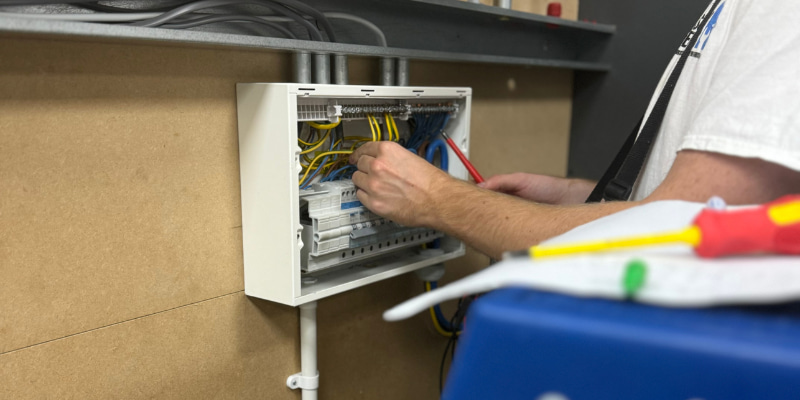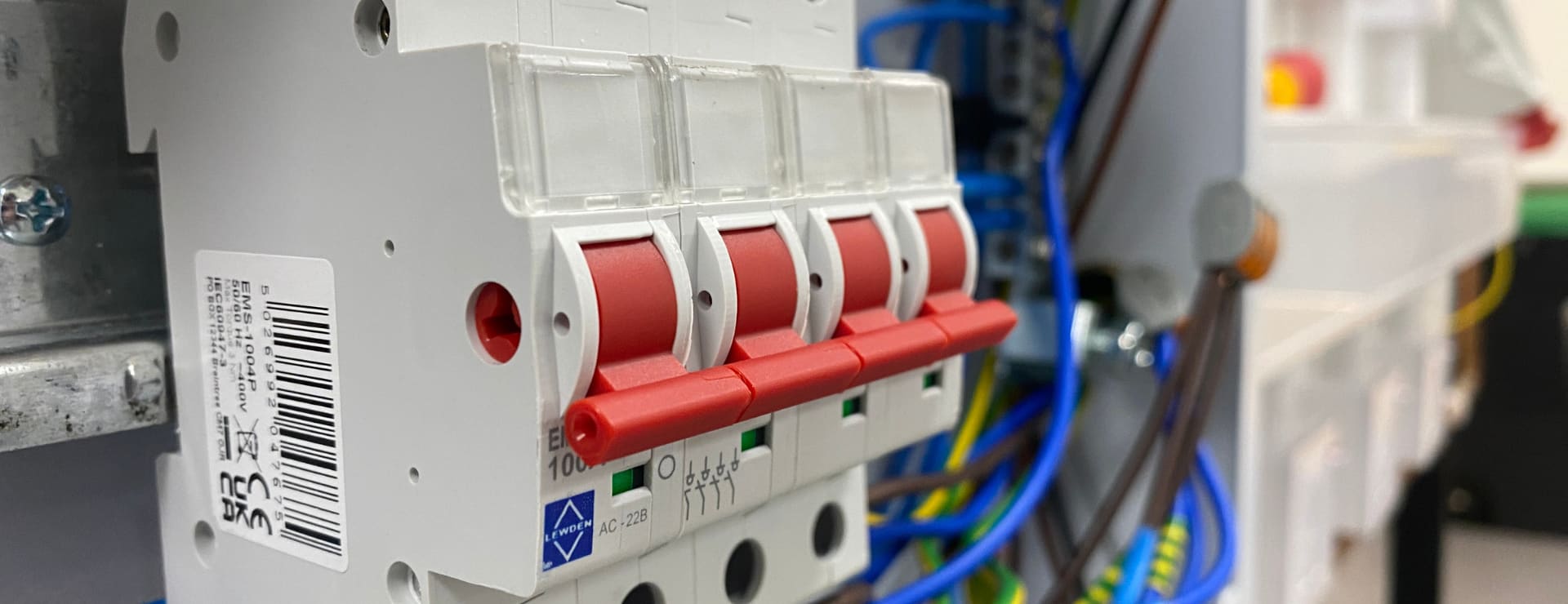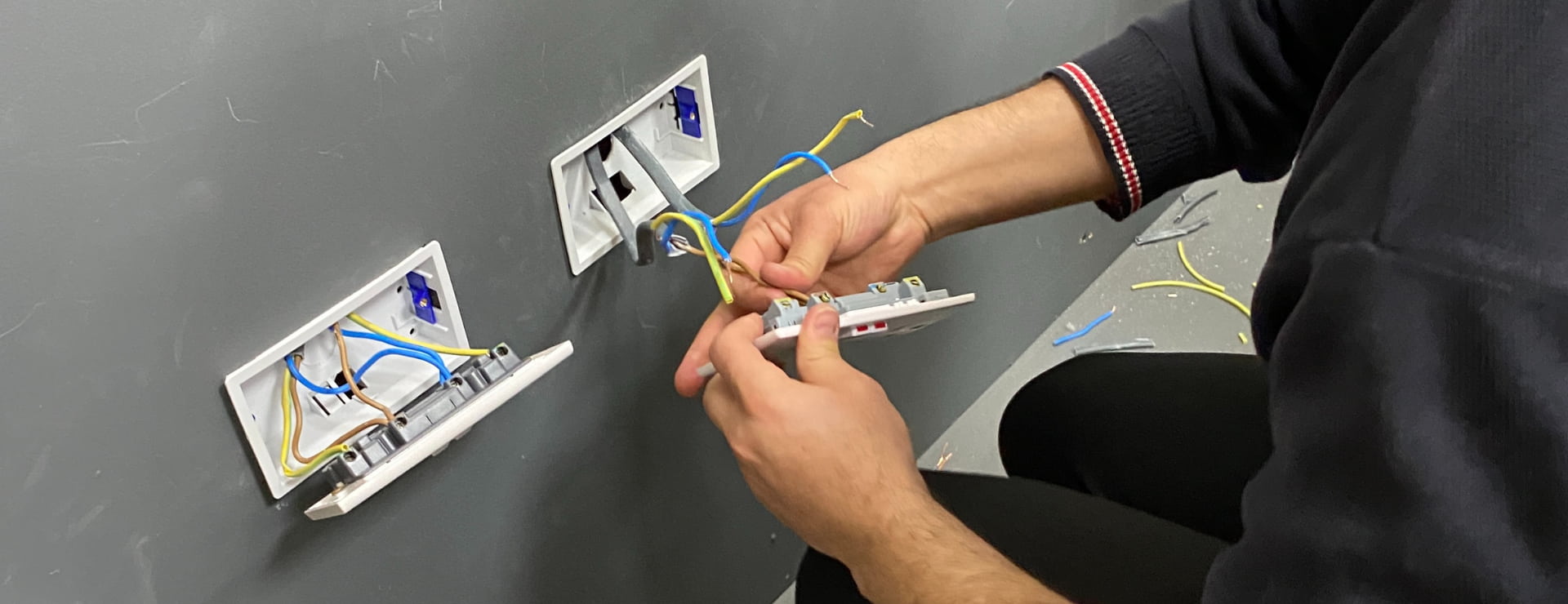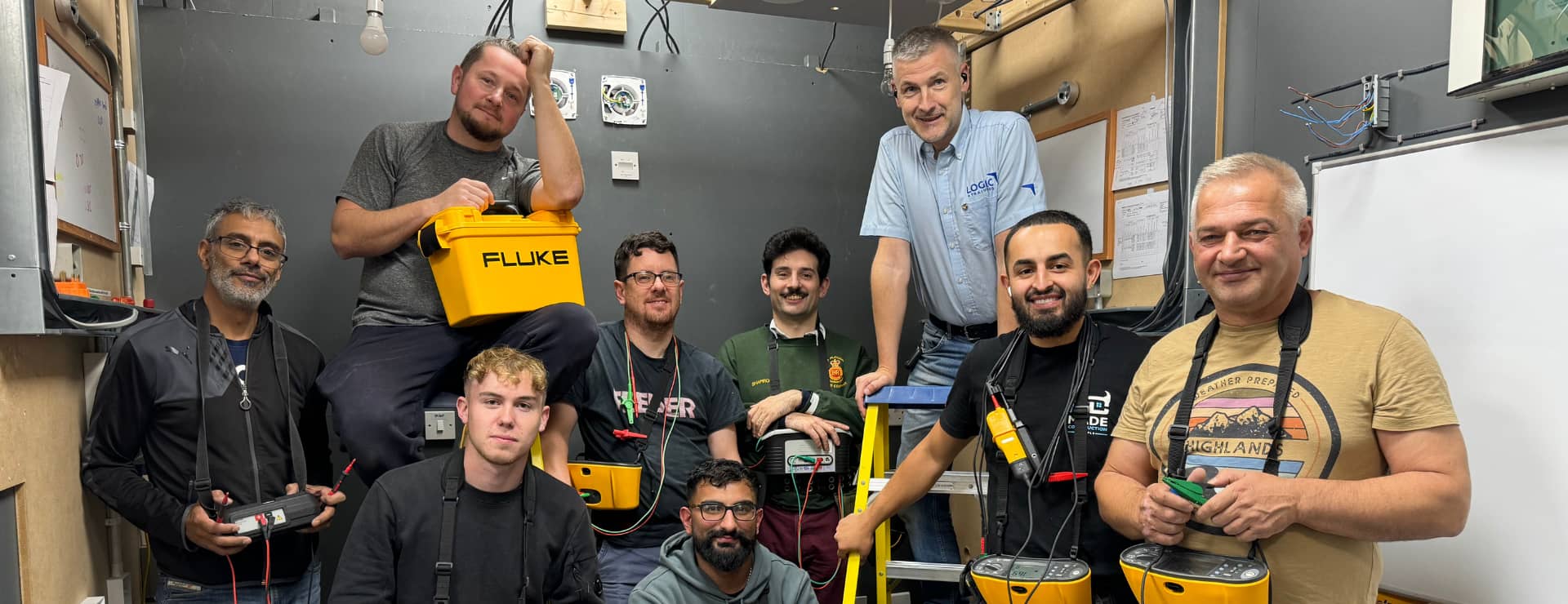
Fast Track Electrician Courses: Shortcut or Setback?
The attraction of fast-track electrician courses is understandable...the promise of a new, well-paid career in a matter of weeks rather than years. However, before investing your time and money, it’s crucial to understand what these courses can and cannot deliver as some training providers promise quick qualifications and flexible learning options, the reality often falls short, leaving many aspiring electricians unprepared for the demands of the industry.

The Rise of Fast-Track Electrician Courses
The electrical industry has experienced unprecedented growth in recent years, driven by the UK’s renewable energy transition, electric vehicle (EV) infrastructure expansion, and energy efficiency mandates. However, the COVID-19 pandemic acted as a catalyst, accelerating demand for electricians while simultaneously reshaping perceptions of vocational training. During lockdowns, widespread redundancies and remote working trends prompted a surge in adults seeking career changes, with online searches for fast-track electrician courses and online electrical courses increasing between 2020 and 2022.
The pandemic disrupted traditional apprenticeship models, as well as the in-centre training courses, forcing many colleges and training providers to pivot to remote learning. While this flexibility appealed to those balancing work or family commitments, it exposed critical weaknesses in purely online formats. A 2020 survey revealed that 55% of apprentices in practical trades struggled with remote learning due to inadequate access to equipment or mentorship. Despite these challenges, the attraction of “fast-track” and “quick qualification” promises grew, particularly among career changers desperate to re-enter the workforce.
From March 2020 to March 2022, Logic4training observed a 300% increase in visits to our New Entrant Domestic Electrical Installer web page, as well as the number of search terms like ‘fast-track electrician course’ and ‘online electrical qualification’ saw drastic spikes over the same time period. Together, these clearly told us there was a growing desire to work in the electrical industry, and these search queries aren’t going away in 2025.
However, this shift raised concerns. Some training providers marketed their courses as shortcuts to full qualification, glossing over the NVQ Level 3 requirements for unsupervised work. Many learners, enticed by low upfront costs and flexible schedules, discovered too late that online modules alone could not replicate hands-on experience.
For career changers, parents returning to work, or those simply wanting a more stable profession, these courses appear to offer a golden ticket. But what’s the reality behind the marketing of online training in the electrical industry?
Reviews of such courses highlighted frustrations, with one student noting:
“I got sent a lot of basic videos to watch and ended up paying £180 per month for videos.’ ‘They are after your money and no education provider.”
And another saying the following:
“‘6 hour livestream with no pause, rewind or ability to fast forward through hours of lecturers answering irrelevant questions…”
What’s shocking is that these reviews are both from 2024, 2 years after the pandemic, when the quality of learning platforms has drastically improved.
Whilst online learning or “learning at a pace that suits you” may sound appealing, we want to make it crystal clear that not all training providers offer a sufficient training course to prepare you for a career in the trades and the potential risks. This is why at Logic4training, we want to tell you that not all electrical courses are created equally.

How Are Electrician Courses Structured?
Electrician courses are designed to condense years of traditional training into a much shorter timeframe, typically lasting anywhere from a few weeks to several months. While the structure of these courses may vary slightly between training providers, most follow a similar format. Let’s break it down.
1. Online Training (Not always a part of fast-track courses)
Some training providers offer online theoretical learning that is generally delivered via webinars, pre-recorded videos, or online modules before their students come to the centre to complete their practical training. This approach appeals to those looking for flexibility, allowing students to study at their own pace. However, the lack of real-time interaction with instructors/trainers can make it difficult for learners to fully grasp complex electrical concepts.
Challenges: Online formats often lead to disengagement and high dropout rates, as students struggle without hands-on guidance or peer support.
Industry Concerns: Critics argue that electrical work requires tactile understanding and direct mentorship, which cannot be replicated through virtual platforms alone.
2. Practical Training
The bit that every student is excited for! Following the successful completion of online training, the student goes to the training provider to learn the practical skills needed to become an electrician. These sessions aim to provide basic practical skills, such as wiring circuits or testing installations.
Challenges: Depending on the training provider, the time allocated for practical training is insufficient to build the depth of experience required for real-world scenarios. Many students report feeling unprepared when transitioning from the classroom to on-site work.
Industry Concerns: Employers often expect candidates to have extensive hands-on experience, which fast-track graduates may lack.
3. Portfolio Building
To meet qualification requirements, most courses include a portfolio-building element where students document their competency in various tasks.
Challenges: Without access to real job sites or supervised work placements, students may struggle to gather sufficient evidence for their portfolios.
NVQ Progression: While some providers promise pathways to NVQ Level 3 qualifications, this often requires additional time and resources beyond the initial course.
4. Final Assessments
Fast-track courses are designed to be completed quickly, with final assessments typically focusing on theoretical knowledge and basic practical skills. These assessments may lead to entry-level qualifications (e.g., Level 2 Tech Cert), but they fall short of what is required for full industry recognition.
While this structure offers convenience and speed, it sacrifices the comprehensive training needed to excel as an electrician. Many students find themselves underprepared for the demands of the electrical industry and must invest additional time and money into further training.
What Fast Track Courses Don’t Tell You
1. Incomplete Qualifications
Most fast-track courses culminate in a Level 2 Technical Certificate rather than the qualifications required to work unsupervised or join a Competent Person Scheme (CPS). Without an NVQ Level 3 or equivalent certification:
- You cannot legally sign off on electrical work in most settings.
- You will struggle to secure employment with reputable firms that require fully qualified electricians.
2. High Dropout Rates
The reliance on online learning contributes significantly to dropout rates among students:
- Many struggle with self-directed study and a lack of interaction with tutors.
- A significant number fail to progress beyond the theory stage due to disengagement or difficulty understanding complex concepts.
3. Misleading Marketing
Fast-track courses are often advertised as direct pathways to becoming fully qualified electricians—an assertion that is rarely accurate:
- Providers use carefully worded claims that make their offerings appear more comprehensive than they are.
- Students frequently report feeling misled about what the course would enable them to achieve upon completion.
4. Negative Experiences
Reviews from past students highlight common frustrations with fast-track courses:
“Everything based on webinars which is pointless when it’s a hands-on job.”
“I got sent a lot of basic videos to watch and ended up paying £180 per month for videos.’ ‘They are after your money and no education provider”
“I was promised ‘around-the-clock support,’ but my tutor was never available when I needed help.”
“6 hour livestream with no pause, rewind or ability to fast forwards through hours of lecturers answering irrelevant questions.
All information within the 6 hour, unedited and unbookmarked streams, are freely available on you-tube or in coursework books from amazon”
These negative experiences underscore the risks of investing in programmes that prioritise speed over substance.
5. Financial Risks
Some fast-track providers tie students into expensive finance agreements without delivering on their promises:
“I’m now paying £180 per month for a course that only provided me with books—I feel trapped.”
“…paying a £500 deposit and £350 per month for four months—a total of £1,900. Despite this, I have received absolutely nothing in return. No materials, no guidance, and no communication from their team.”
Industry Implications
The rise of fast-track courses has broader implications for the electrical industry:
Safety Risks: Inexperienced individuals pose potential hazards to themselves and others when performing electrical work without adequate training or supervision.
Skills Gap: The focus on quick qualifications fails to address the industry’s need for well-rounded professionals with both theoretical knowledge and practical expertise.
By choosing comprehensive training programmes like those offered by Logic4training, aspiring electricians can avoid these pitfalls and build a solid foundation for long-term career success.
Not All Courses Are Created Equal
At Logic4training, we ensure that all theoretical learning is carried out in-centre with your trainer. This allows our students to complete both theoretical learning and practical training side by side. For example, in the morning, they may be learning about the wiring of a plug in the classroom, and then in the afternoon, they will be in the workshop actually wiring a plug.
We feel that this provides learners with an optimal learning environment as they get to put into practice what they learnt there and then. This is also better for different learner types and breaks up the day, as we all know that completing endless hours of theoretical learning can be dull.
Additionally, and most importantly, we provide our students with clear, transparent information on what they will achieve through our electrical training courses. Any training provider that avoids clear answers or beats around the bush when responding to questions regarding their course should be highlighted as a red flag. Clarity is key when finding the right course and training provider.

Who Might Benefit from a Fast-Track Electrician Course?
While fast-track courses can fall short of providing the comprehensive training needed to work independently as an electrician, they can still be beneficial for specific groups of people. Here’s a deeper look at who might benefit from these courses and why:
Career Changers
For individuals with prior experience in construction, engineering, or related fields, beginner electrical courses can serve as a valuable stepping stone. These individuals often already possess transferable skills, such as understanding technical drawings, basic safety protocols, and working with tools. A fast-track course can help them build on this foundation by introducing electrical principles and practical skills.
Example: A construction worker transitioning into the electrical trade may find these courses useful to gain foundational knowledge before pursuing further qualifications like the NVQ Level 3.
Why it Works: Their familiarity with on-site environments and hands-on work means they are better equipped to handle the practical demands of the trade.
Property Owners
Homeowners or landlords looking to perform basic electrical work on their own properties may find beginner courses helpful. These individuals are not necessarily aiming to become fully qualified electricians but want to understand electrical systems for minor repairs or installations.
Example: A landlord managing multiple properties might take a course to learn how to safely replace sockets or light fittings, reducing reliance on external contractors for small jobs.
Caution: While these skills are useful, property owners must remain aware of legal restrictions and safety standards. For example, Part P of the Building Regulations requires some types of electrical work in domestic properties to be certified by a qualified electrician.
Stepping Stone Learners
Some individuals view fast-track courses as an entry point rather than an endpoint in their journey to becoming an electrician. They recognise that additional qualifications, such as the NVQ Level 3 and AM2 assessment, along with significant on-site experience, will be required to achieve full competency.
Example: A young adult exploring career options might start with a beginner’s course to test their interest in the trade before committing to a longer apprenticeship or advanced training programme.
Why it’s Beneficial: These learners approach fast-track courses with realistic expectations, using them as part of a broader plan for career development.
Why Experience Is Key
Practical experience is the backbone of any successful career in the electrical trade. Here’s why experience matters:
Building an On-Site Portfolio
Completing an NVQ Level 3, or equivalent qualification, is essential to becoming a fully qualified electrician in the UK. This qualification requires candidates to compile a portfolio of evidence demonstrating their ability to perform various tasks safely and competently in real-world settings.
Why It Matters: Employers and Competent Person Schemes (CPS) rely on this portfolio to verify that candidates can apply their knowledge practically and meet industry standards.
Gaining Professional Experience
After completing a fast-track course, aspiring electricians typically need 2 years of supervised work experience before they can join CPS schemes or work independently.
This period is crucial for:
- Developing problem-solving skills by encountering diverse challenges on-site.
- Gaining confidence in using tools and technologies specific to the trade (e.g., multimeters, cable testers).
- Learning how to collaborate effectively with other tradespeople on projects.
Limitations Without Experience
Even advanced certifications like the AM2 assessment require candidates to demonstrate practical competence. Without sufficient on-site experience, learners may struggle with these assessments or face barriers when seeking employment.
Our Thoughts
At Logic4training, we understand why fast-track electrician courses are so appealing. Many people want to retrain quickly and enter a rewarding, skilled profession. However, our experience shows that becoming a competent and safe electrician requires more than just speed. Real expertise is built on a foundation of practical skills, industry-recognised qualifications, and hands-on experience.
Our approach is centred on quality and long-term success. We offer small class sizes, expert trainers with years of industry knowledge, and a strong focus on practical training in realistic environments. Our aim is for learners to not only gain their qualifications but also gain the confidence and competence to work safely and effectively in the real world.
We also believe in transparency. All our courses are clearly mapped to the qualifications required by the industry, such as those recognised by the Joint Industry Board (JIB), Electrotechnical Certification Scheme (ECS), and Competent Person Schemes like NAPIT and NICEIC. We set out our learners for a sustainable and successful career, not just a quick certificate.
The feedback from our learners speaks volumes. Many highlight our supportive trainers, well-structured courses, and the practical value of our training centres. We pride ourselves on delivering a learning experience that is both rigorous and supportive, preparing you for the demands of the electrical industry.
If you’re considering a fast-track route, make sure you choose a provider that values your long-term success and safety as much as you do. At Logic4training, we’re committed to helping you build a solid foundation for your future as an electrician.

Start Your Electrical Career with Logic4training
At Logic4training, we have created a structured electrical training course that has been specifically designed for beginners or individuals with little experience, so that their training is tailored to varying career goals.
Key advantages of Logic4training:
- Hands-On Training in Modern Facilities: Unlike many fast-track providers that rely heavily on online learning, Logic4training prioritises practical experience in state-of-the-art training centres.
- Small Class Sizes: Learners benefit from personalised attention and guidance from experienced instructors.
- Support Beyond Training: From job search assistance to business start-up advice, Logic4training ensures learners are equipped for success.
- Proven Track Record: With over 22 years of experience and consistently positive student reviews, Logic4training is trusted by thousands of aspiring electricians.
Reviews & Testimonials
At Logic4training, we take immense pride in the positive feedback we receive from our students. Our commitment to providing high-quality training, experienced instructors, and state-of-the-art facilities is reflected in the glowing reviews shared by those who have trained with us. Here’s a selection of what our learners have to say:
“The training facilities were very well-equipped. The tutors brought vast knowledge and technical skills”.
“Best training courses I’ve been on, tutors are fantastic and really knowledgeable and helpful (Malcolm especially). Just a well run training centre, cant fault it. 100% recommend!”.
We’re proud of the reputation we’ve built over the years. Don’t just take our word for it, hear from all of our students:
- Visit our Reviews Page for detailed feedback on a wide range of courses.
- Check out our reviews on Google and Trustpilot to see why so many learners recommend us.
- Watch their testimonials on our YouTube channel.
- Read our case studies: Olha – From Barista to Electrician & Mandeep – Becoming an Electrical Installer
Whether you’re starting your journey in the electrical trade or looking to upskill, Logic4training is committed to helping you achieve your goals with confidence and competence.
By choosing Logic4training, you can avoid the pitfalls of fast-track courses and build a solid foundation for success in the electrical industry.
FAQs
Logic4training focuses on in-centre theoretical learning and hands-on practical training in modern facilities with expert instructors. We differ from some of our competitors as we don’t offer online learning as part of our courses. This is because online learning can lead to many issues for learners, and we want to provide the best learning environment possible.
Get hands-on with our training facilities, meet real instructors, and discover the right course package for your career goals.
We also provide tailored packages and support for career progression.
While they offer convenience, they often lack depth and practical training. Most students still need additional qualifications and experience to work independently. It is best to check with the training provider to see if their course gets you the qualification you need, should you successfully complete their fast-track electricians course.
At Logic4training, we offer routes for individuals who are looking to join a competent person scheme (CPS) so that they can work independently.
Generally, no, not straight after completing a fast-track course as you will need to join a competent person scheme (CPS), which requires you to have at least 2 years of experience in the industry.
Hands-on training is essential in the electrical trade because it bridges the gap between theory and real-world application, allowing trainees to develop practical skills, technical proficiency, and muscle memory through direct experience with tools and materials. This approach enhances problem-solving abilities, builds confidence, and reduces errors by letting learners practice tasks under expert supervision, turning mistakes into valuable lessons. Additionally, hands-on training boosts engagement and information retention, prepares electricians for evolving industry technologies, and fosters teamwork and communication skills, ensuring they are fully equipped to meet the demands and challenges of the profession.
From biotechnology to electrical installer



